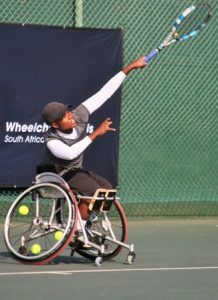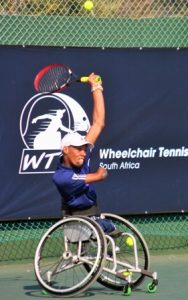
Hailing respectively from Newcastle [KZN] and Seshego [Limpopo], the duo household names, veterans of 5 Paralympics among them, triumphed to amass a total amount of R34 084.
Very much the drawcards coming into the tournament Sithole and Montjane, graduates of special needs schools [Soshanguve Philadelphia Secondary School and Helena Franz] – the two lived up to their billing by duly overcoming Danny Mohlamonyane and Nalani Buob of Switzerland, respectively.
Ranked 1st in SA and 4thin the world in quads, self-taught and much travelled Sithole, also happens to be talented in other pursuits as he is a Maskandi vocalist with two albums under his belt already – with a single titled, Ezintabeni, apparently the instantly recognizable of his offering.
A semi-professional under the tutelage of Holger Losch since 2007/8, Sithole, who matriculated in 2010 and participated in the London and Rio Paralympics, insists that his sporting trajectory doesn’t emphasise so much on winning medals and trophies – as it does on his goal of putting wheelchair tennis on the map and inspiring youngsters in the process.
For world 9th ranked queen and BSc Recreation and Leisure Studies graduate from the University of Venda, Montjane, who started her ascendency to being the country’s No1 from back in 2005 – her latest triumph is one of numerous which also encapsulates her having being pitted with international opponents at the Beijing, London and Rio Paralympics.
Their victories, including another for Montjane in the women’s doubles final – were part of 6 played on the last day of the Wheelchair Tennis South Africa showpiece and also incorporated the men’s singles and doubles and juniors – with the latter final providing a mixed-gender contest between 17 year old, Adelaide Tambo LSEN Secondary School grade 11 pupil, Alwande Skhosana and World No24 Buob, who was the most overworked player of the competition since she participated in no less than a trio finals – all of which lost.
Unsurprisingly, at some stage in the day, after one of her matches, the Swiss lass was spotted sobbing whilst her coach tried consoling her courtside. In wheelchair tennis, unlike in the able-bodied version of the sporting code, mixed-gender contestation is permissible and in the case of the Joburg Open, the situation came about owing to an unbalanced ratio of participants in the juniors division – which ultimately resulted in the duo meeting each other.
The unfortunate Buob was one of four participants at a tournament which is one of about six held in the course of any given year locally but part of around 170 internationally, and the low foreign turnout was owing to other players being involved in others strewn across the globe, at any given period – Wheelchair Tennis South Africa manager, Karen Losch pointed out.
But another two, apart from Buob, of four who showed up, included Israeli, Veronica Zvak [who partnered Montjane in the women’s doubles win] and 28th world ranked Japanese, Yoshinobu Fujimoto.
The 41 year old Chiba Prefecture resident [a repeat visitor to these shores, so much so that tournament officials good-naturedly pointed that it was about time that he was granted a South African passport] teamed up with local Evans Maripa to overcome the duo of Leon Els and Skhosana, 6-3, 4-6, 10-8 – in the men’s doubles.
Receiving a trophy courtside after one of his matches the affable soul pointed at the afternoon Soweto sun and exclaimed, “Thank you everybody … good sunshine!” – upon being invited to make an acceptance speech. Apt intonation from a native of Nippon – land of the rising sun!
Maripa, who judging by the spectator clamour around the gallery, appeared to be a favourite hitter, didn’t disappoint the noisy horde as he triumphed on the two occasions he strutted his stuff in both the men’s singles and doubles.
Some rules of the game differentiate wheelchair tennis from the able-bodied version, in that, at some tournament levels, contestants can self-score their matches; balls other than the live ones can lie within the court whilst play is on but so long as players can’t step on them; in the quad division, another person [as in a player’s trainer] can bounce the ball on behalf of their charge when serving as well as electrical wheelchairs being permissible; matches can be played sans ball boys or girls – inter alia.
The realisation of competitions such as the Joburg Open owe much to the endeavours of individuals such as Wheelchair Tennis South Africa manager Karen Losch, a bespectacled, white-haired industrious soul who oversees some 50 centres which include special needs schools and rural and urban communities nationwide from which pools of players are drawn and whom her organisation, an affiliate of Tennis South Africa, provide with basic aids such as wheelchairs, rackets and trainers.
Given that some of the players live on social grants, Losch pointed out that it’d be of great benefit to attract sponsors – adding that the number of tournaments they are able to host, depend largely on funding filtering through.

WTSA’s efforts are manifesting through though in pockets of evidence such as the Adelaide Tambo School’s contribution of players such as Skhosana and the local tournaments serving as platforms to have home-grown talents such as Sithole and Montjane maintaining International Tennis Federation rankings – since points earned within the country contribute to overall standings.
Wheelchair tennis has four levels namely grand slam, super series, ITF 1-3 and futures – which constitutes the entry level of world rankings.
The R259 200 total prize money Joburg Open was an ITF 2 event and pending the winter schools’ break, Losch’s organisation has a further treat for the residents of Soweto with the beginning of the Soweto Open – a futures level event immediately commencing on Friday.

